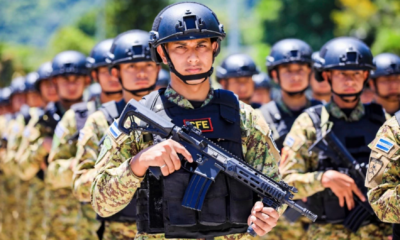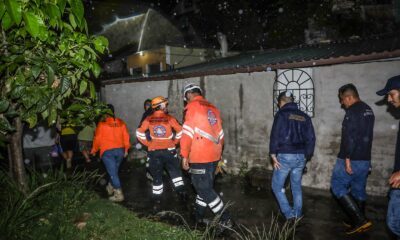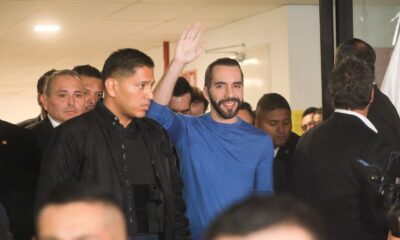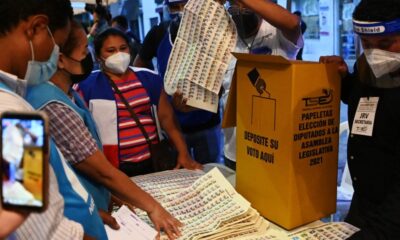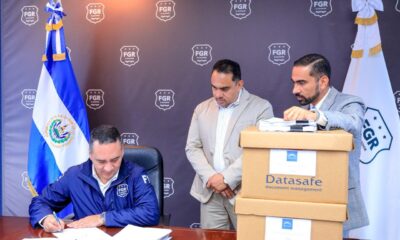International
The OAS wraps Mexico with a resolution that “condemns strongly” the assault on Ecuador
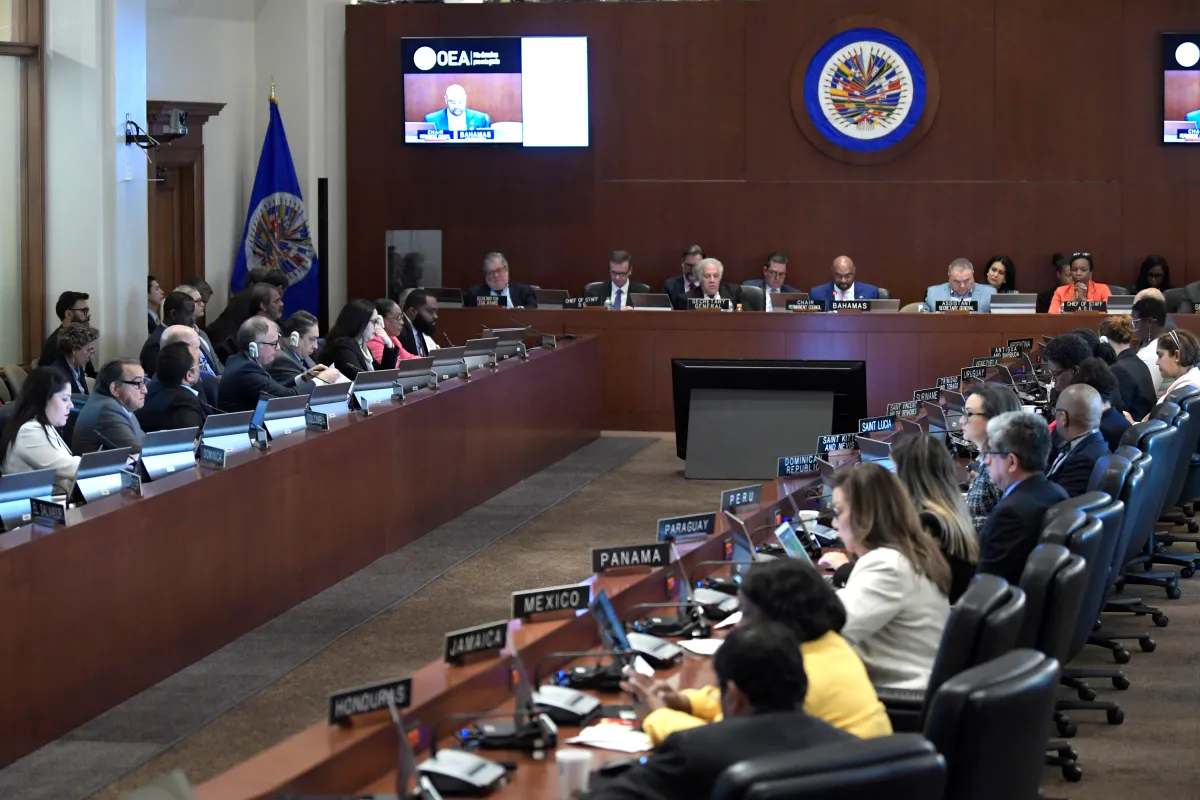
The Organization of American States (OAS) wrapped Mexico on Wednesday and approved a resolution that “energically” condemns the incursion of the Ecuadorian Police into the Mexican embassy in Quito last Friday.
The resolution, presented to the Permanent Council of the OAS by the delegation of Colombia, was approved with the favorable vote of the vast majority of countries and the only vote against Ecuador.
The delegation of Mexico did not appear in session, while El Salvador abstained in the vote.
The resolution resolves to “vehemently condemn the intrusion into the facilities of the Mexican Embassy in Ecuador and the acts of violence exercised against the integrity and dignity of the diplomatic personnel of the mission.”
The document reaffirms “the obligation of all States to ensure respect for the privileges and immunities of diplomatic missions” and calls for respect for the Vienna Convention on Diplomatic Relations, which establishes that embassies are inviolable.
The events occurred last Friday night, when, by order of the Ecuadorian president, Daniel Noboa, the country’s police broke into the Mexican embassy to arrest Jorge Glas, former vice president of Rafael Correa prosecuted for corruption and who had requested political asylum from Mexico.
The images of the security cameras, which were projected during the OAS session, show how the police pointed weapons and subdued Roberto Canseco, in charge of the diplomatic mission, to the ground while they took Glas.
After that episode, Mexican President Andrés Manuel López Obrador broke diplomatic relations with Ecuador, which justifies his actions by accusing Mexico of having violated international asylum treaties by sheltering a person prosecuted for corruption.
The resolution adopted in the OAS also reaffirms “the obligation” that States have to “respect in their entirety” the provisions of the 1954 Diplomatic Asylum Convention and recalls that diplomats are obliged “not to interfere in the internal affairs” of the receiving State.
Likewise, the document urges Ecuador and Mexico to “initiate a dialogue and take immediate action to resolve this serious issue constructively.”
This Wednesday’s session, convened at the request of Colombia and Bolivia, two allied governments of Mexico, is the second of this week after Tuesday’s, which Ecuador convened to justify its actions.
The Minister of Foreign Affairs of Ecuador, Gabriela Sommerfeld, described this Wednesday as “fair” the OAS resolution, which recalled the obligation of States to respect the Diplomatic Asylum Convention of 1954.
“It is a fair resolution, where you can see the non-compliance with the use of diplomatic headquarters as well, so let’s go ahead like Ecuador, we are also going to enforce our version of the facts,” he said.
He added that these are international forums “which are made so that, in a balanced way, through dialogue, in a respectful way, all parties are listened to and resolutions are taken.”
Asked about whether Ecuador is willing to engage in a dialogue with Mexico, the minister reiterated that her country “is always open to strengthening relations with absolutely all countries.”
And, when asked if the country is willing to apologize to Mexico, the head of diplomacy said: “That is not at the discussion table at this moment.”
Central America
Senator Van Hollen Meets with Deported MS-13 Member in El Salvador; Trump and Bukele React

U.S. Democratic Senator Chris Van Hollen, representing the state of Maryland, held a meeting in El Salvador with deported MS-13 gang member Kilmar Ábrego García, a member of the criminal group classified by the U.S. government as a terrorist organization.
“Kilmar Ábrego García, miraculously resurrected from the ‘extermination camps’ and ‘torture chambers,’ now sipping margaritas with Senator Van Hollen in the tropical paradise of El Salvador!” wrote President Nayib Bukeleon X (formerly Twitter), sharing photos of Van Hollen, Ábrego García, and a lawyer sitting together at a Salvadoran hotel.
The deported gang member is seen wearing a plaid shirt and a flat-brimmed cap, seated at a table with glasses and coffee cups. The senator also shared images of the meeting on his own social media accounts.
Bukele reaffirmed that Ábrego will remain in El Salvador and will not be returned to the United States.
“Now that his health has been confirmed, he has earned the honor of remaining under the custody of El Salvador,” Bukele added.
Former U.S. President Donald Trump criticized the senator’s meeting with Ábrego on Truth Social, calling Van Hollen “a fool” for advocating for Ábrego’s return to the U.S.
International
Pope Francis Appears for Easter Blessing, Calls for Peace and Religious Freedom

Pope Francis, still recovering from pneumonia, appeared on the balcony of St. Peter’s Basilica in the Vatican on Easter Sunday and, with a faint voice, wished a “Happy Easter” to the thousands of faithful gathered to celebrate the Resurrection of Christ.
A month after being discharged from a lengthy hospital stay, the presence of the 88-year-old pontiff had remained uncertain, with the Vatican not confirming his attendance ahead of time.
Eventually, the pope made a brief appearance in a wheelchair shortly after 12:00 p.m. (10:00 GMT) to deliver his traditional “Urbi et Orbi” blessing (“to the city and to the world”).
Although no longer wearing an oxygen cannula, the Argentine Jesuit relied on a close aide to read his Easter message, which touched on major global conflicts.
Francis condemned the “dramatic and unworthy humanitarian crisis” in Gaza and called for a ceasefire, while also expressing concern over the “growing climate of antisemitism spreading across the globe.”
He further emphasized the importance of religious freedom and freedom of thought, stating that without mutual respect, “peace is not possible.”
International
Thousands rally nationwide against Trump’s threat to U.S. democracy

Thousands of protesters gathered on Saturday (April 19, 2025) in major cities like New York and Washington, as well as in small communities across the United States, in a second wave of demonstrations against President Donald Trump. The crowds denounced what they view as growing threats to the country’s democratic ideals.
In New York City, demonstrators of all ages rallied in front of the Public Library near Trump Tower, holding signs accusing the president of undermining democratic institutions and judicial independence.
Many protesters also criticized Trump’s hardline immigration policies, including mass deportations and raids targeting undocumented migrants.
“Democracy is in grave danger,” said Kathy Valyi, 73, the daughter of Holocaust survivors. She told AFP that the stories her parents shared about Adolf Hitler’s rise to power in 1930s Germany “are happening here now.”
In Washington, demonstrators voiced concern over what they see as Trump’s disregard for long-standing constitutional norms, such as the right to due process.
-

 International5 days ago
International5 days agoArsenal stun Real Madrid at the Bernabéu to reach Champions League semifinals
-

 Central America4 days ago
Central America4 days agoNicaraguan Exiles to Mark 7th Anniversary of 2018 Protests with Global Commemorations
-

 International4 days ago
International4 days agoDominican ‘False Hero’ Arrested for Faking Role in Nightclub Collapse That Killed 231
-

 International3 days ago
International3 days agoACLU seeks emergency court order to stop venezuelan deportations under Wartime Law
-

 International5 days ago
International5 days agoBogotá residents line up for yellow fever vaccine amid national alert
-

 Central America3 days ago
Central America3 days agoUN complaint filed against Costa Rica over detention of migrant children
-

 International5 days ago
International5 days agoDeSantis’ immigration crackdown sparks alarm in Venezuelan Communities in Doral
-

 International5 days ago
International5 days agoMexico refuses to restore ties with Ecuador while Noboa remains in office
-

 International2 days ago
International2 days agoThousands rally nationwide against Trump’s threat to U.S. democracy
-

 Central America22 hours ago
Central America22 hours agoSenator Van Hollen Meets with Deported MS-13 Member in El Salvador; Trump and Bukele React
-

 International22 hours ago
International22 hours agoPope Francis Appears for Easter Blessing, Calls for Peace and Religious Freedom






































































